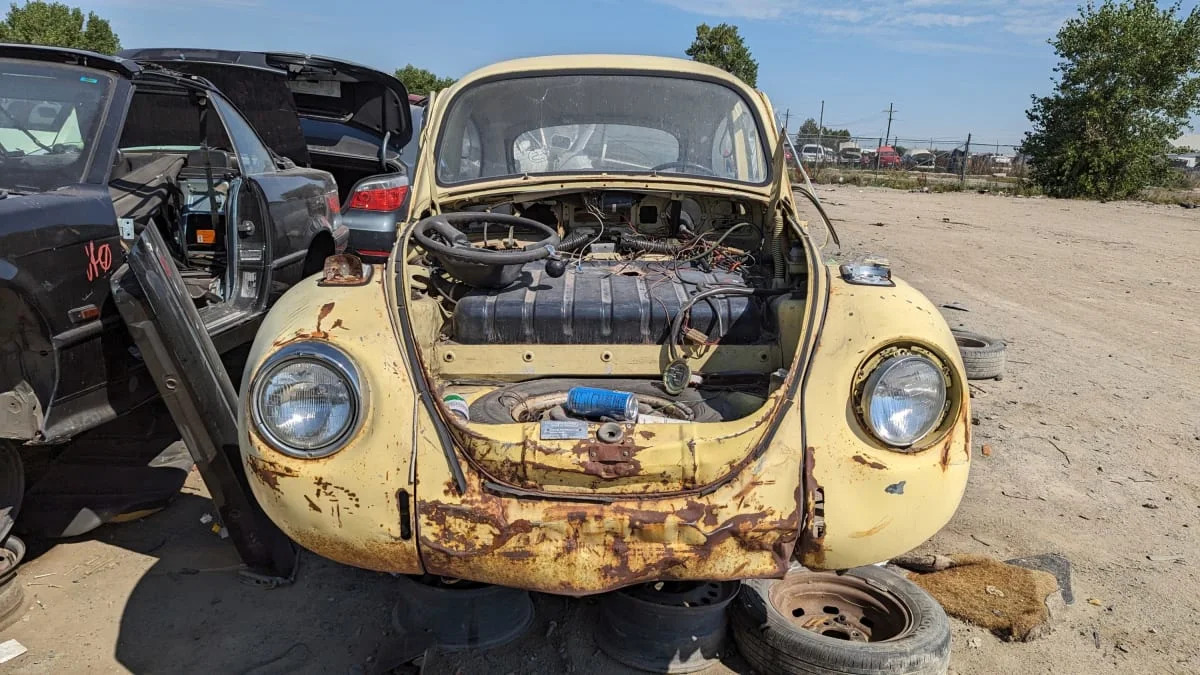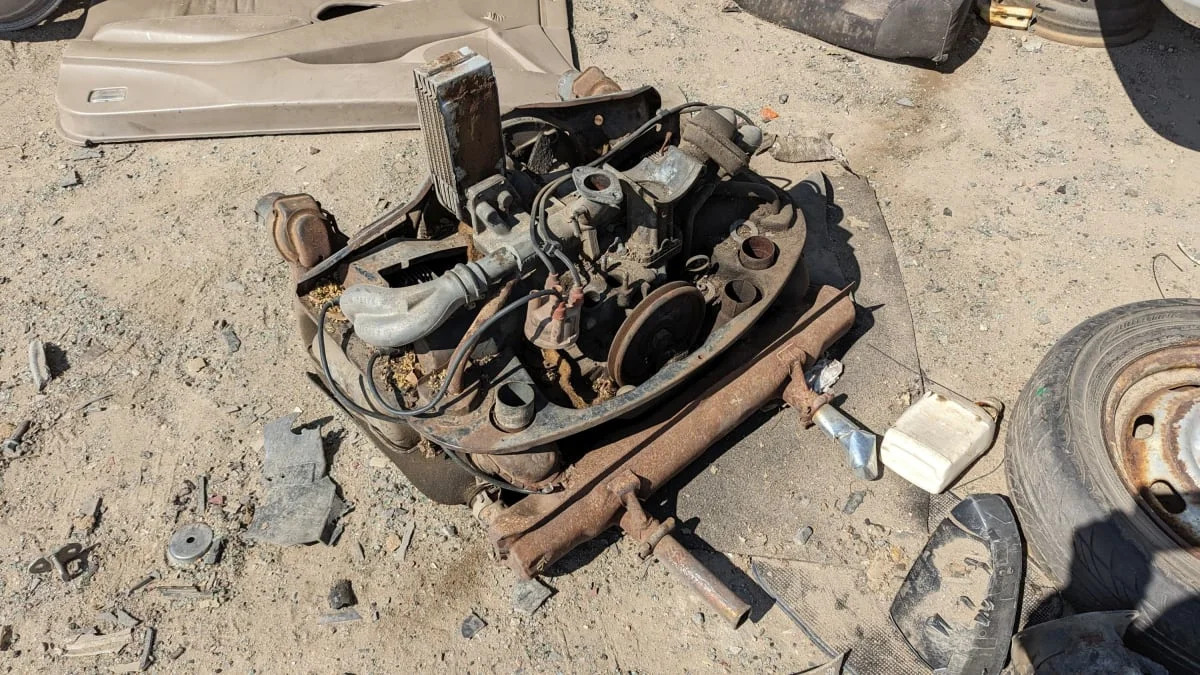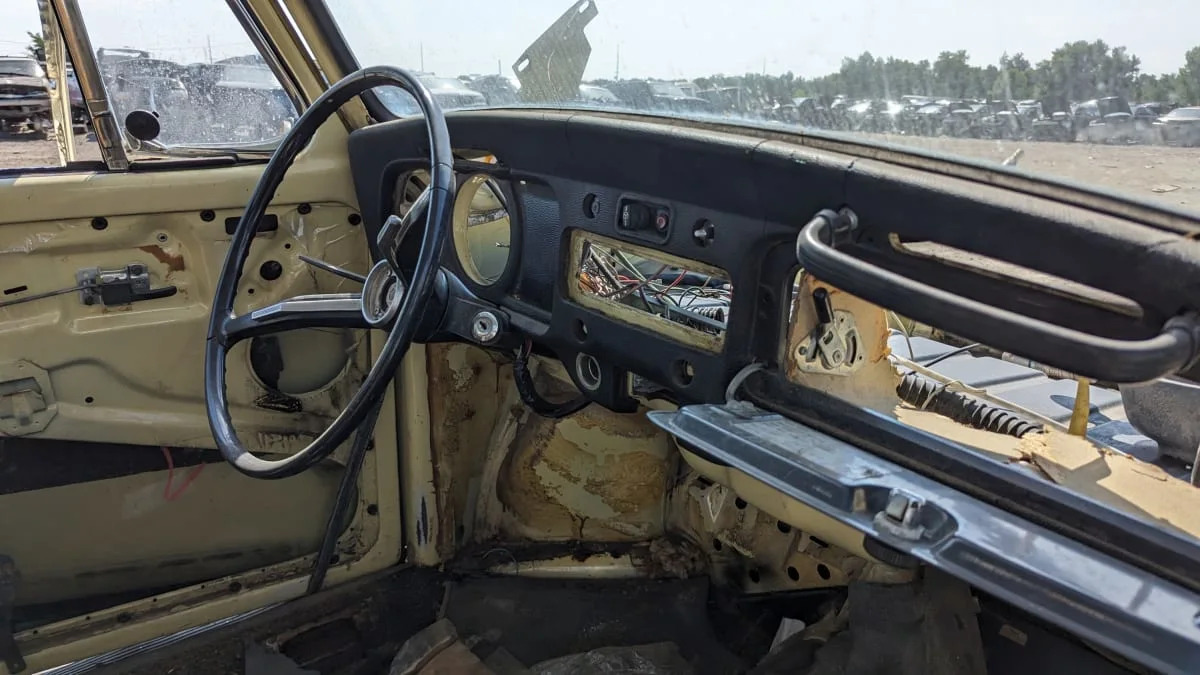Volkswagen built the original Type 1 Beetle in essentially the same form from 1938 all the way through 2003, a production record approached only by that of the Hindustan Ambassador/Morris Oxford. There was only one version of the Type 1 that differed greatly from the original in its chassis engineering: the Super Beetle, sold in the United States from 1971 through 1979. We admired a used-up 1970 Beetle convertible in Nevada last spring, and now we’ve got this first-year Super Beetle in Colorado.
The Super Beetle was an attempt by the suits in Wolfsburg to buy time until the introduction of modern cars with water-cooled engines driving the front wheels, which showed up here in the 1974 (Dasher) and 1975 (Rabbit) model years. The main feature that made the Super Beetle super was the replacement of its funky torsion-bar front suspension with a futuristic MacPherson strut rig. The traditional four-wheel drum brakes remained, naturally (to be fair, even some Rabbits had drums all around at first).

The Super Beetle got a completely revised front body in the process. The car’s overall length increased a bit, making room to lay the spare tire flat (instead of being angled upward as in the regular Beetle) and providing much more cargo space in the frunk. For 1973, the Super Beetle got a space-age windshield with curved glass, merely a couple of decades after the rest of the automotive world.

You need to be a fairly serious air-cooled VW aficionado to tell the Super from the regular Beetle at a glance; the most obvious giveaway is the longer and flatter hood.

The Super’s rear suspension was the same as all the (1968 and later) Beetles.

The engine was the same between the two models as well. If this is the original (which is possible but doubtful, given how easy it is to swap these things and how plentiful VW air-cooled engines used to be in the junkyard ecosystem), then it’s a 1585cc boxer-four rated at 60 horsepower and 81.7 pound-feet.

Some junkyard shopper yanked this engine but didn’t buy it. The oil-cooler doghouse and carburetor are gone, though we can’t know whether they were off the car when it got here or bought from U-Pull-&-Pay. Note the heat-exchanger outlets coming off the exhaust manifolds; they (theoretically) provided heat and (often) carbon monoxide to the passenger compartment during times of cold weather.

Two transmission choices were available for the 1971 Beetle and Super Beetle: the base four-on-the-floor manual and the nightmarish “automatic” four-speed known as the Automatic Stickshift (which had a clutch operated via a switch on the gearshift lever and a torque converter to allow idling in gear). This car has the regular manual.

The MSRP for the 1971 Super Beetle was $1,985, which is about $15,345 in 2023 dollars. The regular 1971 Beetle cost just $1,845, or $14,263 in today’s money. So, yes, an incredibly antiquated car even by 1971 standards, but also reliable and simple transportation for dirt cheap.

The Super Beetle had serious price competition for ’71, though. For example, the 1971 Austin America (yes, British Leyland sold the AD016 here) had the exact same price tag of $1,985, and it had a real heater plus hydrolastic suspension. The 1971 Plymouth Cricket aka Hillman Avenger listed at $1,915 ($14,804 now), the Renault 10 cost $1,845 (yes, same as the regular Beetle), the Toyota Corolla was $1,798 ($13,899 today) and the motorcycle-engined Honda 600 sold for $1,395 ($10,784 after inflation) in 1971. Or how about a new Fiat 850 sedan for $1,555 ($12,021 now)?

Having owned and daily-driven both regular and Super Beetles, I never noticed any difference in quality of handling or comfort between the two types. Air-cooled Volkswagen sales in the United States peaked during the 1968-1970 period and then plummeted dramatically after 1974, when stricter safety and emission-control regulations really started to bite. Still, the Super Beetle sedan remained available here through 1976, and the Super Beetle Convertible held on through 1979.

Was this one worth saving? Not in this condition.
18,000,000 sold!
It was known as the 1303 in its homeland.
